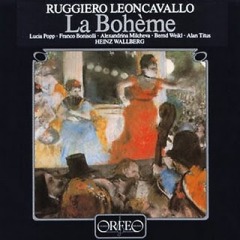Ruggiero Leoncavallo - La Bohème (1963)
Ruggiero Leoncavallo - La Bohème (1963)

1. Atto I
2. Atto II
3. Atto III
4. Atto IV
Marcello: Franco Bonisolli
Mimi: Lucia Popp
Rodolfo: Bernd Weikl
Musette: Alexandrina Milcheva
Schaunard: Alan Titus
Barbemuche: Alexander Malta
Visconte Paolo: Jörn W. Wilsing
Gustavo Colline: Raimund Grumbach
Gaudenzio: Friedrich Lenz
Durand: Norbert Orth
Il Signore: Albert Gassner
Eufemia: Sofia Lis
Münchner Rundfunkorchester
Heinz Wallberg
Puccini's "La Boheme" was produced in Turin on February 1, 1896. Although Leoncavallo seems to have begun writing first, his opera followed in Venice on May 6, 1897. "Since that time," wrote Silvia Camerini in an essay that accompanied another recorded version of this opera, "a simplistic and senseless mistake has always been made: that of comparing the two Bohemes. Indeed, apart from the common source of their inspiration, the artistic personalities of the two composers and the consequent interpretations are so different and distinct one from the other as to render any serious comparison impossible." That statement surely earns both the fur-lined teacup and the leather medal for being one of the most fatuous statements in the famously fatuous literature of opera. How can anyone NOT compare the two Bohemes?
Bar for bar of the music and phrase for phrase, Puccini and Leoncavallo write in pretty much the same verismo idiom. Leoncavallo can match Puccini in providing orchestral lushness but seems less inclined to so so. Puccini has the better sense of overall structure, brilliantly mixing darkness and light in three of his four acts. Leoncavallo, following a simpler path, goes straight from two acts of giddiness into two acts of gloom.
As for the individual arias, sometimes the similarities get downright eerie. In Act II, Leoncavallo's tenor Marcello finds Musette's furniture in the street. He asks her to move in with him in "Io no ho che un povera stanzetta" (rendered by one translation in lumpy fashion as "I have but a poor little room.") Leoncavallo's aria has the texture and spirit of "Che gelida manina" almost perfectly but it does not develop from that point. Musette does not reply to Marcello in the same heightened manner that Puccini's Mimi does to Rodolfo and there is no advance into glorious duet.
Leoncavallo's "La Boheme" is a sound piece of work with some good tunes. Had it not been torpedoed by Puccini, it would probably be lurking at the edges of the standard repertory in very much the same manner as "Adriana Lecouvreur." As an alternative version of a great masterpiece, it should be in every serious collection of opera recordings, just like, say, Nicolai's "Merry Wives of Windsor."
Ultimately, this is not the work of genius that is Puccini's, but it is brimful of skilful orchestration, lovely tunes and varied emotions and is well worth getting to know.
download: uploaded anonfiles yandex 4shared solidfiles mediafire mega filecloudio nornar
Last Updated (Monday, 27 January 2014 21:30)








